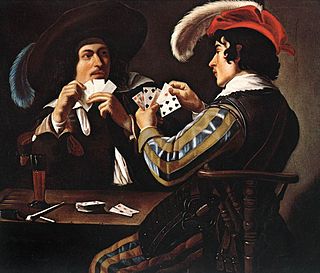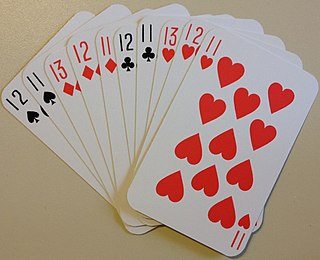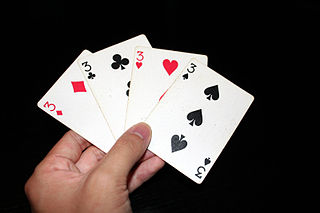Related Research Articles

A card game is any game using playing cards as the primary device with which the game is played, be they traditional or game-specific.

Pinochle, also called pinocle or penuchle, is a trick-taking, Ace-Ten card game typically for two to four players and played with a 48-card deck. It is derived from the card game bezique; players score points by trick-taking and also by forming combinations of cards into melds. It is thus considered part of a "trick-and-meld" category which also includes the game belote. Each hand is played in three phases: bidding, melds, and tricks. The standard game today is called "partnership auction pinochle."

A trick-taking game is a card or tile-based game in which play of a hand centers on a series of finite rounds or units of play, called tricks, which are each evaluated to determine a winner or taker of that trick. The object of such games then may be closely tied to the number of tricks taken, as in plain-trick games such as Whist, Contract bridge, Spades, Napoleon, Euchre, Rowboat, Clubs and Spoil Five, or to the value of the cards contained in taken tricks, as in point-trick games such as Pinochle, the Tarot family, Mariage, Rook, All Fours, Manille, Briscola, and most evasion games like Hearts. The domino game Texas 42 is an example of a trick-taking game that is not a card game. Trick-and-draw games are trick-taking games in which the players can fill up their hands after each trick. In most variants, players are free to play any card into a trick in the first phase of the game, but must follow suit as soon as the stock is depleted. Trick-avoidance games like Reversis or Polignac are those in which the aim is to is avoid taking some or all tricks.

500 or five hundred, also called bid Euchre is a trick-taking game that is an extension of euchre with some ideas from bridge. For two to six players, it is most commonly played by four players in partnerships, but is sometimes recommended as a good three-player game. It arose in America before 1900 and was promoted by the United States Playing Card Company, which copyrighted and marketed the rules in 1904. 500 is a social card game and was highly popular in the United States until around 1920 when first auction bridge and then contract bridge drove it from favour. 500 continues to enjoy popularity in Ohio and Pennsylvania, where it has been taught through six generations community-wide, and in other countries: Australia, New Zealand, Canada (Quebec) and Shetland. The originator of Five Hundred, US Playing Card Company of Cincinnati, Ohio, now has headquarters across the Ohio River in Erlanger, Kentucky, west of Covington, KY. Five hundred is now the national card game of Australia.

Gin rummy, or simply gin, is a two-player card game created in 1909 by Elwood T. Baker and his son C. Graham Baker. It is a variant of rummy.
Five-card stud is the earliest form of the card game stud poker, originating during the American Civil War, but is less commonly played today than many other more popular poker games. It is still a popular game in parts of the world, especially in Finland where a specific variant of five-card stud called Sökö is played. The word sökö is also used for checking in Finland.

Texas hold 'em is one of the most popular variants of the card game of poker. Two cards, known as hole cards, are dealt face down to each player, and then five community cards are dealt face up in three stages. The stages consist of a series of three cards, later an additional single card, and a final card. Each player seeks the best five card poker hand from any combination of the seven cards of the five community cards and their two hole cards. Players have betting options to check, call, raise, or fold. Rounds of betting take place before the flop is dealt and after each subsequent deal. The player who has the best hand and has not folded by the end of all betting rounds wins all of the money bet for the hand, known as the pot.

Euchre or eucre is a trick-taking card game commonly played in Canada, New Zealand, Great Britain, and the United States. It is played with a deck of 24, 28, or 32 standard playing cards. Normally there are four players, two on each team, though variations are played that range from two to nine players.

Spades is a trick-taking card game devised in the United States in the 1930s. It can be played as either a partnership or solo/"cutthroat" game. The object is to take the number of tricks that were bid before play of the hand began. Spades is a descendant of the Whist family of card games, which also includes Bridge, Hearts, and Oh Hell. Its major difference as compared to other Whist variants is that, instead of trump being decided by the highest bidder or at random, the Spade suit always trumps, hence the name.
In trick-taking card games, a revoke is a violation of the rules regarding the play of tricks serious enough to render the round invalid. A revoke is a violation ranked in seriousness somewhat below overt cheating, and is considered a minor offense when unintentional.

Bid Euchre, Auction Euchre, Pepper or Hasenpfeffer, is the name given to a group of card games played in North America based on the game Euchre. It introduces an element of bidding in which the trump suit is decided by which player can bid to take the most tricks. The primary differences are the number of cards dealt, absence of any undealt cards, the bidding and scoring process, and the addition of a no trump declaration. It is typically a partnership game for four players, played with a 24, 32 or 36-card pack, or even two decks of 24 cards each. It should not be confused with another game also called Bid Euchre q.v. Five Hundred.

Tonk, or tunk, is a matching card game, which combines features of knock rummy and conquian. Tonk is a relatively fast-paced game that can be played by 2-4 players. It was popular with blues and jazz musicians in southern Louisiana in the 1930s, including Duke Ellington's orchestra, and was played during breaks in the back rooms of bars and saloons. In many other places it has become a popular pastime for workers while on their lunch breaks. It can be played for just points or for money wagered.

Euchre is a 19th-century trick-taking card game and has many variations.
The following is a glossary of poker terms used in the card game of poker. It supplements the glossary of card game terms. Besides the terms listed here, there are thousands of common and uncommon poker slang terms. This is not intended to be a formal dictionary; precise usage details and multiple closely related senses are omitted here in favor of concise treatment of the basics.
Draw poker is any poker variant in which each player is dealt a complete hand before the first betting round, and then develops the hand for later rounds by replacing, or "drawing", cards.

Euchre has many variations in game playing. Some of them are designed for two, three, five or even six hands. Described below are some of these variations. Some are called “Johann.”

The following is a glossary of terms used in card games. Besides the terms listed here, there are thousands of common and uncommon slang terms. Terms in this glossary should apply to a wide range of card games. For glossaries that are specific to one game, see Game-specific glossaries.

A talon in card games is a stack of undealt cards that is placed on the table to be used during the actual game. Depending on the game or region, they may also be referred to as the stock, widow, skat, tapp, dobb or kitty.

Binokel is a card game for two to eight players that originated in Switzerland as Binocle, but spread to the German state of Württemberg where it is typically played with a Württemberg pattern pack. It is still popular in Württemberg, where it is usually played in groups of three or four as a family game rather than in the pubs. In three-hand games, each player competes for himself, while in four-hand games, known as Cross Binokel (Kreuzbinokel), two teams are formed with partners sitting opposite one another. The game was introduced to America by German immigrants in the first half of the 20th century, where it developed into the similar game of Pinochle. Binocle was still played in Switzerland in 1994.

Bester Bube, Bester Bauer, Bester Buur, Beste Boeren (Holland), Fiefkarten, Fiefkaart, Fiefkort or Fiefander (Holstein), or Lenter is an historical German card game for 3–6 players played with a Piquet pack. It is one of the Rams group of card games characterised by allowing players to drop out of the current game if they think they will be unable to win any tricks or a minimum number of tricks.
References
- ↑ The Official Rules of Card Games – Hoyle Up-To-Date. Read Books Limited. 2014. p. 177. ISBN 978-1-4733-9540-4 . Retrieved 30 September 2018.
Misdealing.—The following are misdeals, the penalty for which is 2 points (scored immediately by opponent): 1. Failure to have pack cut. 2. Dealing a card incorrectly, and failing to correct the error before dealing another card. 3. Exposing a ...
- ↑ The Recent Beginner (2009). Enjoy Beginning Bridge: How to Enjoy Learning Beginning Bridge. AuthorHouse. p. 17. ISBN 978-1-4490-0861-1 . Retrieved 30 September 2018.
After ensuring that there has been no misdeal, the players sort their hands, usually by suit and rank within each suit and begin the play of the tricks.
- ↑ Furman, T.M. (2017). The Ethics of Poker. McFarland, Incorporated, Publishers. p. 200. ISBN 978-1-4766-2785-4 . Retrieved 30 September 2018.
Misdeal: A misdeal is a hand that is dealt improperly—a player not receiving a card or too many cards, for example. If a misdeal is detected early enough, the cards are returned to the dealer and a new hand is dealt.
- ↑ Greiner, R. (2005). The Everyday Guide to Recreational Poker. The Everyday Guide to. Everyday Endeavors Llc. p. 37. ISBN 978-0-9769703-0-9 . Retrieved 30 September 2018.
Facing a non-repairable misdeal, the right thing to do is to declare the game scratched and re-deal.
- ↑ Wood, C.; Goddard, G. (1940). The Complete Book of Games. Garden City. p. 40. Retrieved 30 September 2018.
The rules covering misdeals are approximately the same for all card games. In general, a misdeal does not lose the deal; the cards are collected, shuffled, cut and dealt again by the same player.
- ↑ Resnicoff, S. (1968). Corners; Commuters' Pinochle (in German). Pageant Press. p. 10. Retrieved 30 September 2018.
A pinochle deck consists of forty-eight cards. ... A misdeal automatically occurs when cards are inadvertently turned face up by the dealer, or where one of the players has more than twelve cards in his immediate view.
- ↑ Rigal, B.; Sharif, O. (2011). Card Games For Dummies. Wiley. p. 178. ISBN 978-1-118-05476-5 . Retrieved 30 September 2018.
Some variations of Spades allow a player to call for a misdeal before the bidding if his hand satisfies certain conditions.
- ↑ Meehan, C.H.W. (1862). The Law and Practice of the Games of Euchre. T. B. Peterson & brothers. p. 92 . Retrieved 30 September 2018.
No player is permitted to take up, or to look at, his cards during the deal, and should a misdeal ensue in consequence of such impropriety, the dealer does not lose his privilege, and may deal anew. It must be considered a misdeal, however, ...
- ↑ Bumppo, N. (1999). The Columbus Book of Euchre. Borf Books. p. 19. ISBN 978-0-9604894-6-6 . Retrieved 30 September 2018.
| This card game-related article is a stub. You can help Wikipedia by expanding it. |